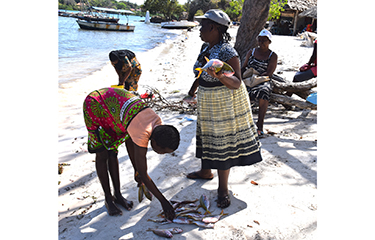A new study has investigated the details of how the outbreak and spread of COVID-19 impacted the availability and supply of seafood, with fish-producing countries in Asia and Africa reporting huge disruptions of their aquatic food value chain in 2020.
With nearly every fish-producing country in the world reeling from the effects of COVID-19 on production, processing, and supply of aquatic food products, the study identifies short- and long-term policy responses that are likely to shape the seafood market trends in Egypt, Nigeria, Bangladesh, India, and Myanmar – with spillover effects to global availability and pricing of seafood products.
The study, "COVID-19 impacts and adaptations in Asia and Africa’s aquatic food value chains," published in Marine Policy after interviews with stakeholders in the seafood value chain in the five countries, found COVID-19 and some policy responses from governments impacted the availability, pricing, and international trade in aquatic foods.
The pandemic and the subsequent fight to eradicate it disrupted “aquatic food value chains, affecting the supply of production inputs, labor, and transport/logistics,” the study said.
The study’s authors, led by Michigan State University Department of Agricultural, Food, and Resource Economics Associate Professor Ben Belton, said COVID-19 containment measures – which in the countries studied were a mix of phased full and partial lockdowns enforced at national or sub-national levels – restricted the movement of people, with businesses and institutions such as markets and schools shutting down.
The stringency of the containment measures, which peaked in April 2020 before easing gradually in a majority of the countries studied, inhibited the mobility of workers and consumers alike, reducing employment and incomes and leading to lower demand for seafood.
The study said that “the combined supply and demand side shocks will affect availability and prices of aquatic foods and inputs for aquatic food production.”
To avoid more severe impacts, governments and seafood industry actors should pursue policy responses that mitigate the immediate impact of COVID-19 and assist in recovery and building of a more resilient aquatic food system in future, the study suggested.
In the majority of the countries where the study was done, governments have introduced some economic policies to ease the COVID-19 burden, including the rolling out of economic stimulus policies “targeting sectors of the economy such as exporters, financial relief for businesses in the form of loans, debt relief, or restructuring, and reduced fees and taxes and also forms of social protection, such as cash transfers to vulnerable households.”
The study recommends an immediate policy response that ensures “the smooth functioning of aquatic food value chains and providing emergency financial support to actors in them.”
Furthermore, governments should ensure transportation and storage, physical marketplaces, and “lateral” value chains delivering inputs are classified under the essential services and goods category.
Seafood actors must also be exempt from movement restrictions, while keeping open and operating the businesses and institutions along the seafood value chain “with social distancing and sanitation provisions such as water and soap for handwashing, and providing personal protective equipment to protect public health.”
Other policy responses the study suggests include formulating and widely publicizing rules governing COVID-19 control measures “to maximize compliance and minimize rent-seeking opportunities.”
Seafood actors along the industry value chain at national and sub-national levels should also step-up consultations “to quickly identify emerging problems in aquatic food value chains and agree on and implement remedies.”
To support national and international seafood trade, the study suggests leaving borders open and avoiding restrictions on imports or exports to help prices remain stable.
Despite the challenges facing the seafood industry due to COVID-19 outbreak, Belton said stakeholders should take the pandemic “as an opportunity to ‘build forward better.’”
“The crisis has helped to expose weaknesses and bottlenecks in global and national food systems and illustrated vividly which policy responses worked and which had unintended negative consequences,” he said.
In their financial results for 2020, publicly traded seafood companies in Africa have said there are clear signs of market disruption and constrained performance due to COVID-19.
For example, South Africa-based Sea Harvest Group said in its financial results for the year ended 31 March, 2021, the COVID-19 outbreak led to “supply-side interruptions affecting throughputs and productivity.”
The company, which spent ZAR 39.2 million (USD 2.8 million EUR 2.3 million) on COVID-19 related costs in 2020, blamed the pandemic for the “difficult trading conditions in the aquaculture segment resulting in significant loss.”
South Africa-based Oceana Group said in its financial results for the year ended 30 September, 2020 that COVID-19 and associated severe lockdown measures “imposed new challenges for the group and its operations.”
However, the decision by South African government to designate the company as an essential service provider in all geographic regions in which it operates, “allowed for the operations to continue during the lockdown period subject to the implementation of stringent standard operating procedures and protocols.”
Photo courtesy of Stop Illegal Fishing







